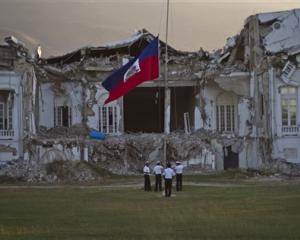
Marie Neslene Leon, center, is congratulated by friends and relatives after her wedding in front of the destroyed national cathedral in downtown Port-au-Prince, Sunday, February 28, 2010. Photo by AP.
"We're still here," Beauzile said. "No matter what the situation is, we are going to be together."
The couple tied the knot in the shadow of the Notre Dame d'Haiti Cathedral, where they attended Mass and the bride sang in the choir before the earthquake caved in the roof and two sides.
The occasion was not entirely joyful: It was hard not think about those who would have attended had they survived the quake, but the ceremony had already been postponed once and the bride and groom felt it was important to go ahead.
It is hard to overstate the devastation of the January 12 quake. It killed an estimated 230,000 people and forced 1.2 million more from their homes. For much of the past seven weeks, ordinary life pretty much stopped. Nearly everyone's life has been upended and grief is universal. But signs of normality are beginning to emerge.
Schools in the capital are still closed, but at least one resourceful businesswoman has set up classes in a tent camp. An unknown number of businesses were lost, but new ones - from beauty salons to stalls that charge cell phone batteries - have emerged in the encampments to serve the newly homeless.
Commercial flights are again arriving in the Port-au-Prince airport - and the traditional troubadour band is back greeting people at the arrivals gate.
Some say such small steps are important as a comfort to people who have lost so much.
Alzire Rocourt, a singer and music teacher, sees hope in the choir rehearsals now held twice a week in the yard of her home. The students from two Catholic schools, many of whom lost parents and friends, wanted to resume their twice-weekly routine of rehearsals. But they had nowhere else to meet.
"Singing for them is consolation. That's what they like to do," Rocourt said. "They find their equilibrium in singing."
Beauzile, 33, and Leon, 30, pulled together many of the trappings of a typical wedding. She wore a full white gown with elbow-length white lace gloves. He wore a charcoal-gray suit. There were several hundred guests. Dozens of passers-by watched from atop piles of rubble in the dusty downtown streets.
Guests sang hymns accompanied by a lone drummer. Leon said she tried unsuccessfully not to think about those who couldn't make the ceremony, including two fellow singers in the choir, because they had been killed in the earthquake.
"I was happy and sad at the same time, because I had friends who were supposed to be there," she said.
Beauzile, who lost a cousin and several friends, focused on the ceremony and pushed out darker thoughts.
"I had to forget everything that has happened in the country for a minute," he said. "It was a special moment."
The Rev. Edwine Saint-Louis, the Roman Catholic priest who presided, said he has performed several weddings. But this was the first at the cathedral since the earthquake.
"The church is destroyed, but we can still carry on," he said. "People are still building families and the church is there to support them."
After the ceremony on Sunday, the couple went back to their temporary home at a tennis-club-turned-refugee camp in Bourdon, a neighborhood off the road that climbs the hill heading out of Port-au-Prince. They had a small celebration, then went off to spend the night at relative's home that survived the quake. Their own was demolished.
"The only celebration we had was we got to spend the night together," Leon, who repeatedly fidgeted with her new gold wedding ring during the conversation, said with a laugh.
The next day, the couple returned to spend the rest of their honeymoon in the family tent. Their immediate prospects are not good. The couple is expecting a child, a girl, in May.
Leon worked as a cashier in a clothing store that collapsed and now she is jobless. Beauzile works as a driver of the often riotously colored taxi-buses known as tap-taps, but he has to sublet a vehicle from the owner and can't get one every day.
As camps go, theirs is among the best. Everyone has an actual tent, as opposed to one fashioned from bed sheets. There is plenty of shade, and the residents have been careful not to disturb the clay courts, though laundry hangs from the nets. Still, it is a camp - with fat rats crawling over the ruins of the clubhouse, where seven people died - and the residents fear the owner could force them to leave at any moment.
Beauzile said his immediate plans are to find a single tent for him and his wife and to get back to work.
"I just want everything to get back to normal," he said.





